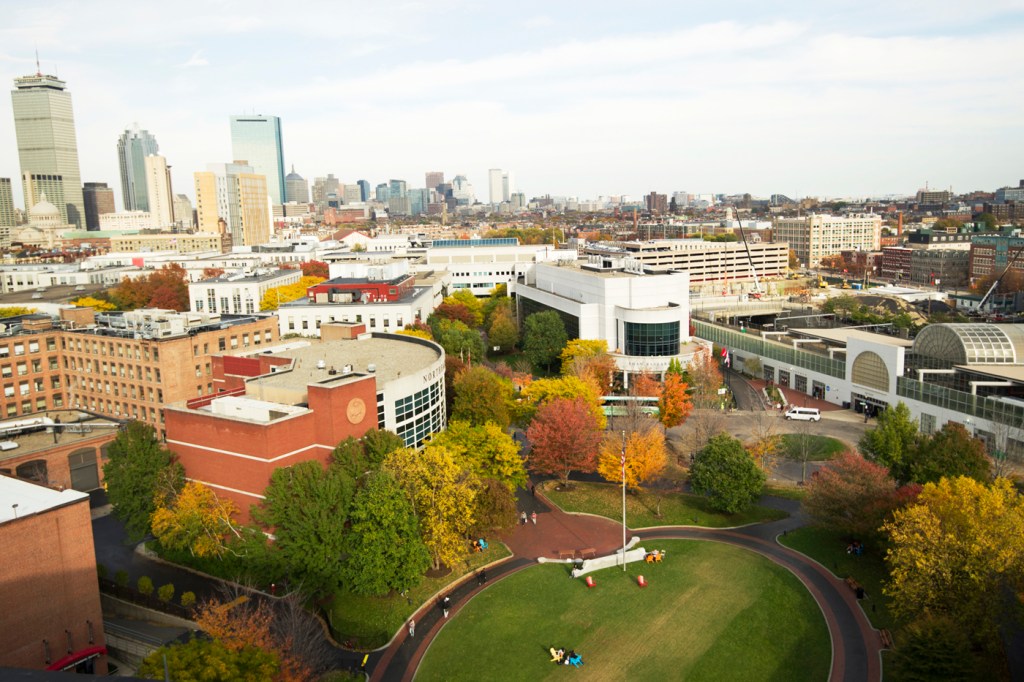Northeastern earns national recognition for community engagement

The Carnegie Foundation for the Advancement of Teaching has selected Northeastern to receive the 2015 Community Engagement Classification, a national recognition that highlights the university’s longtime institutional focus on community engagement.
In selecting Northeastern, the Carnegie Foundation noted that the university has shown “excellent alignment among campus mission, culture, leadership, resources, and practices that support dynamic and noteworthy community engagement.”
“Northeastern University is engaged with our community and with the world,” said Joseph E. Aoun, president of Northeastern. “This engagement is central to our mission. Our faculty and students impact communities worldwide, and are impacted by them. The enrichment is mutual.”
Northeastern is now one of 361 institutions holding this elective classification, which began in 2006 and is managed and administered by the New England Resource Center for Higher Education. Northeastern will hold the classification until 2025, at which time it can seek re-classification.
“These are campuses that are improving teaching and learning, producing research that makes a difference in communities, and revitalizing their civic and academic missions,” John Saltmarsh, director of the New England Resource Center for Higher Education, said in a statement announcing this year’s classification recipients.
The university’s community engagement commitment extends to its financial aid investment, particularly through scholarships that support local youth, who participate in community service as part of their scholarships. Northeastern last year provided 150 graduates of Boston Public Schools with full tuition need-based scholarships, in addition to hosting college readiness events for BPS students and their families. Other full tuition programs include the Civic Engagement Program and the innovative Torch Scholars program, which aims to close the college achievement gap for first-generation and low-income students who have overcome exceptional odds. Financial assistance is also provided through other programs such as the Ujima Global Leaders Program and the Foundation Year program, which is designed to increase college access to BPS graduates.
The Office of City and Community Affairs has served as the principal point of engagement with neighborhood and community groups, serving as a liaison between Northeastern and its more than 250 community partners. The office also oversees the Center of Community Service, which plays an integral role in students’ involvement in these efforts through programs such as Alternative Spring Break and organizing service days and volunteer fairs.
Students have collectively performed more than 1.2 million hours of community service since 2006. These efforts dovetail with Northeastern’s service-learning initiatives, which integrates experiential learning partnerships between faculty-led courses and community-based organizations. Through these partnerships students engage in many hands-on service projects and opportunities. U.S. News and World Report named service-learning at Northeastern among the best in the nation for the fourth year in a row.
Community engagement is a central theme across students’ learning experiences both in and out of the classroom, including academic programs and majors, research opportunities, co-ops, study abroad, and senior capstone projects. What’s more, last year Northeastern launched its Social Impact Lab, a hub of innovative experiential curricula, programming, and events designed to empower social change and civic engagement across disciplines and worldwide. The lab’s signature program is “Giving With Purpose,” the first-ever massive open online course focusing on philanthropy and informed civic engagement; the lab also houses Northeastern Students4Giving, an experiential philanthropy education program.
In addition to its own students, Northeastern also leads many youth education initiatives, such as those through the Center for STEM Education and the Urban Health Research and Practice, as well as the College of Science’s National Science Foundation-funded outreach program Physics Theorynet. These also include the Balfour Academy at Northeastern, a college readiness program for Boston students through a summer enrichment program and tutoring throughout the academic year; SquashBusters, a sports-based youth enrichment program combining athletics, academics, and community service; and NUTRONS, a Northeastern student-led robotics engineering team that collaborates with and mentors high school students.
This commitment also extends to community development. Northeastern partnered with government and community groups for the 2012 opening of the new Whittier Street Health Center on Tremont Street. Other efforts include transforming the Columbus Avenue corridor by helping to secure a $20 million federal grant in 2014 for upgrades at the Ruggles MBTA station. These renovations will be completed in harmony with the university’s under-construction, state-of-the-art Interdisciplinary Science and Research Complex, which is the first private research development in Boston’s Roxbury neighborhood.
Northeastern’s research centers also provide extensive community benefits, as faculty and students conduct research to identify and implement real solutions to societal challenges currently facing urban areas throughout greater Boston.
Looking forward, Northeastern is also creating a university-wide Center for Community Engagement and Neighborhood Opportunity that will coordinate, track, and annually assess all of the university’s community engagement efforts. The center will serve as a central point of contact for community members and partner organizations to connect with Northeastern’s community engagement programs, provide designated space for the university’s direct service programs and partners to convene large community groups, and facilitate community input into engagement initiatives.




